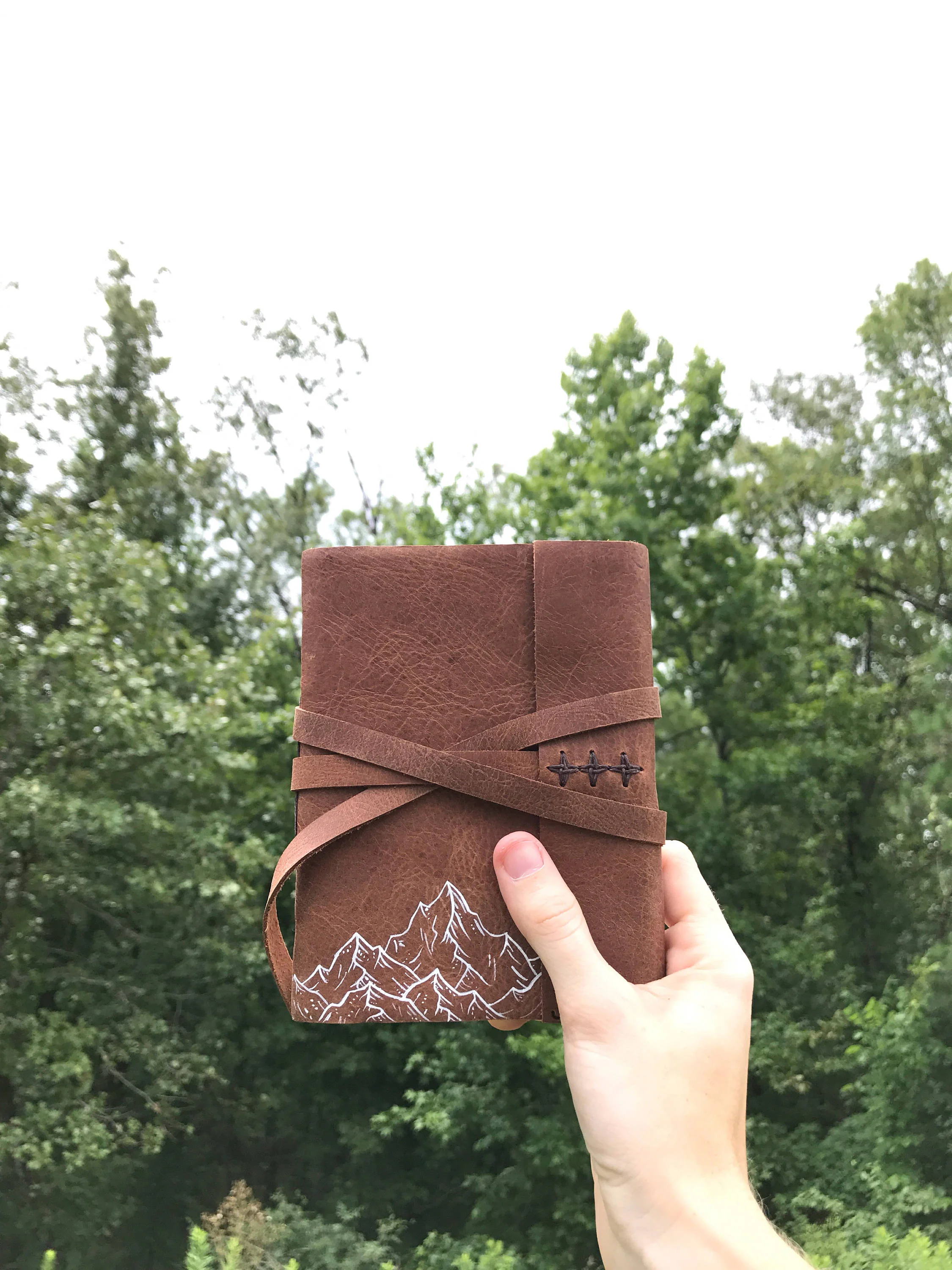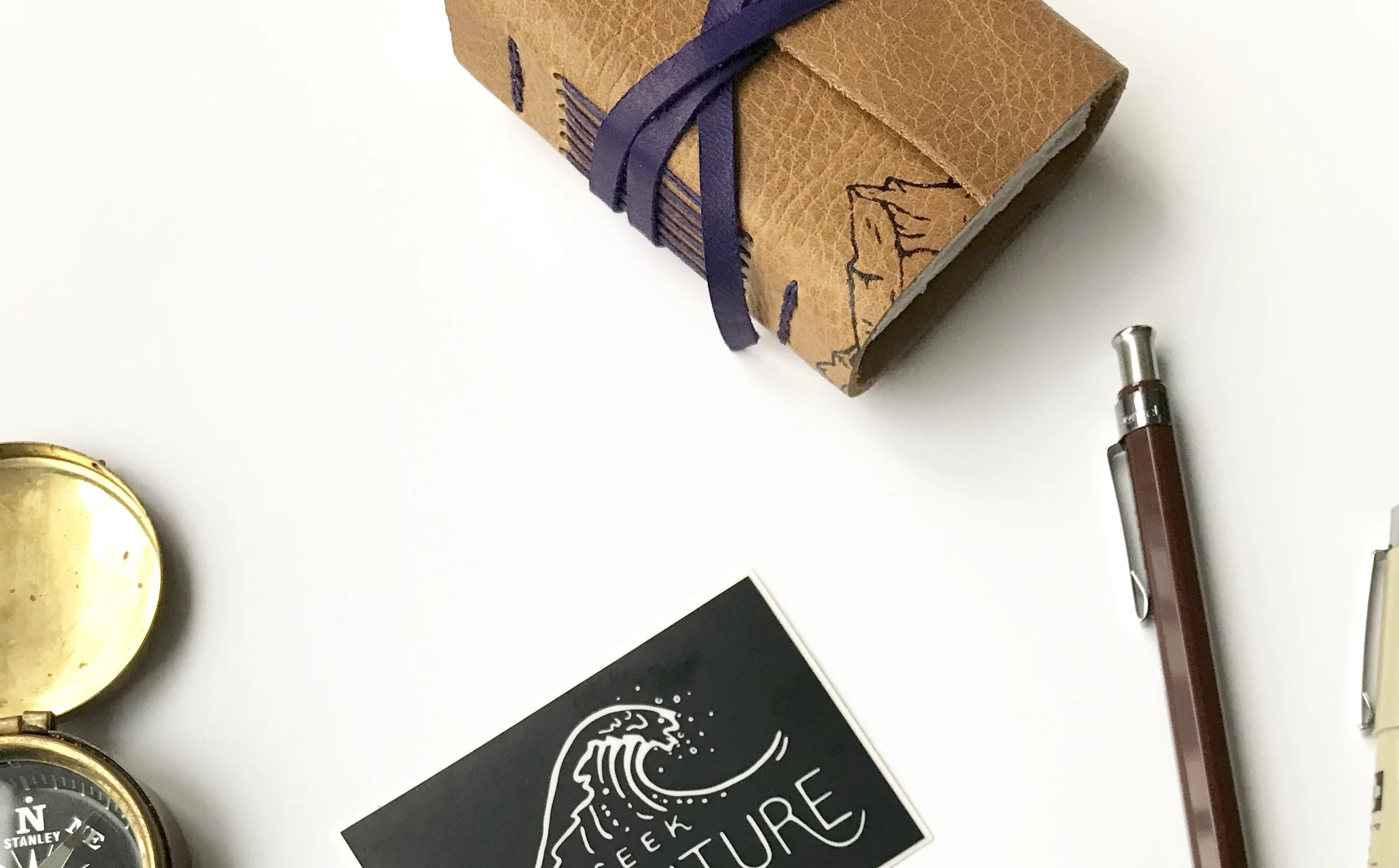Some of the greatest writers in recent centuries - Virginia Woolf, Oscar Wilde, Henry David Thoreau, and Sylvia Plath, to name a few - were also avid diarists (journal-writers). They knew how important it was to write their own private thoughts and stories, in addition to those which they published. But journaling isn't just for authors and writers. Journaling is for everyone; journaling is for you. It doesn't matter if you are a full time traveler and adventurer, or if you think your life is too boring to write about (and you'd be wrong); journaling is for you, and it will change your life.
1. Journaling is a Great Excuse to Practice Your Handwriting.
You might not be surprised to learn that in today’s world of laptops and tablets, and smartphones, when many states don’t teach cursive writing in schools anymore, we can easily go for extended periods of time without writing a single thing down by hand. In fact, a recent survey of 2,000 people in Britain showed that the average respondent had not put pen to paper at all in the previous 41 days. Even crazier than that, is that one out of three respondents to this survey had not written by hand in the previous six months. Six. Months. Additionally, over half said their handwriting was noticeably worse than in the past, and one in seven even said they were ashamed of their handwriting.
Journaling is one of the best ways to combat this decline in the art of handwriting. My handwriting is not beautiful by a long shot, but it has improved greatly since I started journaling regularly, and even more so since I switched to journaling in cursive. Handwriting is one of those things that won’t improve by reading about it or looking at someone else’s – though that may be inspiring – your handwriting will only improve when it is practiced. And, what better way to practice than by journaling your own story?
2. Journaling Helps You to Improve Your Writing Skills.
Journaling does not only help you to improve the appearance of your writing, but it will also help you to improve the craft of your writing. This is important whether you want to be a successful novelist or full-time blogger, or even if you just want to get a good job or get into graduate school someday. Writing is another one of those skills you can only improve with practice. You have to write, and write a lot, to find your way into the realm of writing well. And, a large part of writing well involves finding your unique literary voice – the habits you form for phrasing things a certain way, or favoring this kind of word instead of that – and the best way to find your literary voice, in my opinion, is by journaling. In a journal, you are writing as yourself; you’re telling the story of your experiences and thoughts and dreams and desires, so you should find your own voice to come naturally. Writer Anaïs Nin said of this aspect of journaling, "Keeping a diary all my life helped me to discover some basic elements essential to the vitality of writing." This takes time, routine, and practice, of course, but so does journaling.
What if you don’t care about your literary voice? Why should you care about the quality of your writing? You should care because although we do a lot of writing in today’s internet-connected world (comments, status updates, Instagram captions, and so on), there aren’t a lot of stand-out writers among us. This matters when you’re sitting down to write your next cover letter for a job application or college application. Lots of people can write a page of fluff about themselves, whether true or inflated, but not very many can write a compelling cover letter that stands out because of the quality of the writing. And trust me, a well written cover letter or query letter can make all the difference you need to stand out from the stack of other applicants.
So, journal. Write and write and write and write. You’ll get better and better at writing, and those improved writing skills may even help you to write a better book or get a better job!
3. Journaling is a Thousand Times Better than a Photo.
I know, this completely contradicts the well-known adage, “a picture is worth a thousand words,” but I believe that no matter how beautiful a picture might be, no matter how vibrant the colors, or compelling the composure, words always have more to tell than a photo can.
Allow me to explain:
Say you’re hiking at Zion National Park in Utah, and you’ve reached the end of the Angels Landing Trail. You snap a photo of the stunning Zion Canyon sprawling into the distance just as the sun touches the horizon in the most beautiful sunset you’ve ever seen. You have an amazing photo, and you’ll probably cherish that photo for the rest of your life. But, there is a lot that the photo can’t say. There’s a whole chunk of the story that the photo can never relate; it’s only a capturing of one millisecond of light and color on paper (or on your phone, if we’re honest here).
Only your words can tell the whole story of how you set out on the Angels Landing Trail earlier that day, full of ambition and excitement, having read about how spectacular and exhilarating the climb would be. Only your words can explain how you were a little disappointed with the first stretch of the trail, as it gently ascended the canyon’s side, but how that disappointment soon gave way to exasperation with 22 steep switchbacks known as Walter’s Wiggles, and finally turned to wide eyed wonder at the last section of the trail, where you had to climb along the rough sandstone ridge, clinging to chains in the rocks, with a sheer drop of hundreds of feet on either side. Only your words can explain the exhilaration you felt once you finally reached the end of your journey, having climbed over 1480 feet, and now enjoyed a vast and jaw-dropping view of this spectacular crevice in the earth called Zion Canyon.
Sure, your photo might remind you of those details, but a photo can’t share the whole story with your friends, or your future great-great-grandchildren. Only your words can do that.
4. Journaling Helps Solidify Your Memories, Making Them Stronger and More Vivid.
Journaling – writing by hand – is a different cognitive process than typing on a computer. Writing by hand is a more sensory action, involving a different movement for every letter and word written, versus typing, which is virtually the same movement for each letter typed (pressing a key on a keyboard). This difference somehow matters in how our brain retains information (and memories), as studies have shown that information written by hand is better retained than that which is typed.
On the less scientific side of the issue, I believe that writing your daily story helps you to keep memories of your experiences more vivid, and less likely to slip away into the sad oblivion of forgotten memories. Take, for instance, my study abroad trip to the Middle East from the summer before my sophomore year of college: I kept a daily journal of my five week trip across Egypt, Jordan, Israel, and Palestine, but was often rushed and sometimes only had time to record the names of the places we visited, with no commentary or self-reflection. But, even just the act of writing down a bare bones description of my day was enough that now, years later, when I read through those basic accounts, more memories flood back in, filling in the details of what I saw or felt or thought about the places I visited. If I had not written even the most basic journal entry for a day, those memories would have been lost forever – or at the least, they would be far more difficult to retrieve from the dark corners of my brain. Eugène Delacroix wrote of this same phenomenon and his own journal, “I regret the gaps. I feel as though I were still master of the days I have recorded, even though they are past, whereas those not mentioned in the pages are as though they had never been.”
5. Journaling Gives You Something to Look Back on in the Future.
We, as humans, are ever-changing creatures. What you do or think or care the most about today may be completely changed in ten years, or a month, or even by tomorrow. A journal acts as a record of this fluidity, giving you a reference to look back on in the future and see how far you’ve come – how you’ve grown and evolved, and how the things you wrote about contributed to that shaping and changing and growing. Eugène Delacroix said of this aspect of journaling: “By keeping a record of my experiences I live my life twice over. The past returns to me. The future is always with me.”
Looking back on your old journal entries can not only be enlightening, but even entertaining. Oscar Wilde wrote, perhaps a bit narcissistically, "I never travel without my diary. One should always have something sensational to read in the train." He makes a good point, though. While it might be very good to see how much you have matured in how you respond to certain situations, it can also be hilarious to read what you wrote about something that happened in your past. Maybe you’ve forgotten about that day full of misadventures on your last vacation, when it seemed like your trip had turned into a demonstration of Murphy’s Law, because everything that could possibly go wrong, went wrong. You wrote about how miserably your day had ended; you had suffered one unfortunate event after another and were left with a headache, a wounded pride, and an empty wallet – but maybe now you can look back and laugh at just how ridiculous the whole story is in hindsight.
6. Journaling Helps You to Improve Your Observation Skills.
This aspect of journaling is a little bit difficult for me to explain, but there is something about the habit of journaling that should lead to a heightened awareness of one’s surroundings. It is something that takes a little more effort than simply chronicling the events of your day. It takes a certain degree of intentional thought, but writing the story of your day is a great first step toward improving your observation of the world around you. For example, in writing about the neat coffee shop you found on your last road trip, perhaps you wanted to describe what was so unique about the place. You looked around you, up at the ceiling, out the window at the beautiful Victorian architecture across the street, taking in the sights and sounds and textures. In this look-around, you probably noticed a few things you had missed before: the warm hum of happy conversations, the gorgeous antique tin ceiling, the cracked patina on the Victorian building’s eaves.
Or, as Anaïs Nin said it, "it was while writing a diary that I discovered how to capture the living moments."
It’s very subtle. But I truly believe that the more you write, the more you will be aware of your surroundings, and the more your observation skills will improve.
7. Journaling is a Healthy Way to Exercise Introspection.
I believe in writing your journal for no one else’s eyes but yours. If you want to write it to someone, as in “Dear Diary,” then write it to your future self. Susan Sontag wrote, "In the journal I do not just express myself more openly than I could to any person; I create myself. The journal is a vehicle for my sense of selfhood." Susan understood how journaling is a sort of writing unlike any other. It is a space with great freedom to express yourself, and therefore a sort of mirror for looking back into yourself and examining your motives, thought processes, and emotions – journaling is the perfect tool for exercising introspection.
I’ve often found in difficult situations in my life – a tough transition, a breakup, a new venture – that it is while journaling about my experience that the situation becomes most clear. It is commonly while writing out my frustrations or fears or hopes that my own confused emotions can settle into navigable patterns, or that the path I must take to move forward presents itself. Just as journaling can provide a record to look back upon in the future, it can also provide a vehicle for your innermost thoughts and desires to face themselves unavoidably in the metaphorical mirror and shake hands and say, “Now that we’re all here, masks off, it’s time for some real talk.”
8. Journaling Allows You to Write Your Story.
This is perhaps the most important point of all.
Douglas Pagels wrote that “every day is a blank page in the diary of your life. The secret in success is in turning that diary into the best story you possibly can.” Does that mean that every day of your life has to be full of heart-pounding adventure? Of course not. The best heroes are the ordinary people who step up in the face of adversity and injustice, and do something extraordinary. They don’t have adventures every single day, but somehow their stories are still compelling. Likewise, you don’t have to have a grand adventure every day, but by writing your everyday stories in your journal, you may grow to see your life as full of everyday adventures. Perhaps they’re small, but they’re yours, and that is what makes them worthwhile and worth recording. In writing your story, I’ll bet that you will be less likely to just glide through your days without thinking much about what you’re doing or why. Because when you sit down to chronicle your actions and happenings and thoughts and desires, I bet you’ll be more likely to be aware of them throughout the day. You might even find yourself actively looking for the story in your days, and what you can’t wait to write about in your journal.
You might find that you have a great story inside you, and you can’t wait to tell it, even if it’s only to yourself.
~~~
You may be thinking, but what will I write in my journal? Check out these prompts to get you started, or get you out of a journaling slump:
➳ How was your day different from what you had planned or expected?
➳ What are you excited about in the near future?
➳ What are you worried about in the near future? (And what steps can you take to conquer it?)
➳ What has been on your mind lately?
➳ What is something about you that would surprise someone who knows you well?
➳ What is the most fun thing you've done lately?
➳ If you could write a letter to your teenage self, what would you say?
➳ What do you love the most about where you live? What would you change?
➳ How different would your life be if you lived in a different century?
➳ What is the one thing you wish you could do every single day?
➳ What is something you are good at?
➳ What is something you wish you were good at?
➳ What inspires you?
➳ What have you done recently that was new or unusual?
➳ What was your favorite moment of your day?
Sources:
http://www.theguardian.com/science/2014/dec/16/cognitive-benefits-handwriting-decline-typing
http://media.cfhdocmail.com/2012/06/handwriting-dying-slow-death.html
http://www.brainpickings.org/2014/09/04/famous-writers-on-keeping-a-diary
You might also like:








